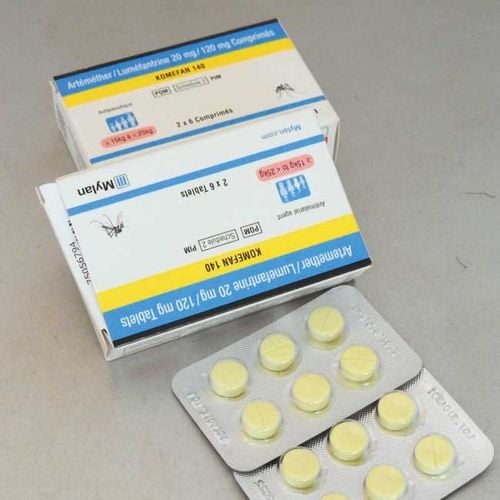This is an automatically translated article.
Malignant malaria is a very serious form of malaria caused by infection with the parasite Plasmodium falciparum, leading to hemodynamic disturbances, microcirculation obstruction, hypoperfusion and hypoxia to the brain, causing a very high risk of death. high if not detected and treated promptly.
1. What is malignant malaria?
Malignant malaria is a serious form of malaria. The basic damage of this disease is the blockage in the small capillaries, causing microcirculation disorders, decreased perfusion, lack of oxygen in the tissues, damage to the viscera, especially in the brain. Most cases of severe malaria are cerebral (accounting for 85%).
Malignant cerebral malaria has the potential to cause coma. According to classification, there are cases of cerebral malignant malaria alone and cerebral malignant malaria accompanied by damage to one or more other organs such as kidneys, lungs, liver, heart, digestive system... Fever If not detected early, timely treatment can lead to complications in other organs, very high mortality rate.
2. Malaria incubation period
The incubation period for malaria from the time of being bitten by an infected mosquito until the first clinical manifestations appear depending on the parasite:
P. falciparum infection, incubation period from 9 - 14 days, average 12 days; P.vivax infection, incubation from 12-17 days, average 14 days; P.malariae infection, it takes 20 days to many months to start the disease; P.ovale infection, incubation lasts from 11 days, sometimes up to 10 months. For malaria infection by blood transfusion, the incubation period depends on the number of parasites in the blood transfused to the patient, but usually in this case the incubation period is quite short, only a few days.
Malaria is usually caused by the parasite P. falciparum, so it is also considered a complication of P. falciparum infection.

Thời gian ủ bệnh sốt rét tùy thuộc loại ký sinh trùng
3. Lesions caused by severe malaria
In addition to the typical manifestations of malaria such as fever, chills, with liver, spleen enlargement or anemia, there are severe forms that can cause death, including cerebral malaria, platelet platelet malaria. , kidney failure, liver failure, cardiovascular failure:
Cerebral type: This is the most common complication of malignant malaria. Prominent premalignant signs are disturbances of consciousness (lethargy, restlessness, delirium, loss of consciousness, slurred speech), persistent high fever, insomnia, severe headache, vomiting or diarrhea. many, physically exhausted. Patients present with psychiatric syndromes such as sudden or gradual coma, deepening, sphincter disturbances, dilated pupils, convulsions similar to epilepsy.
Other signs include respiratory disturbance or respiratory failure due to cerebral edema, sputum retention. Blood pressure increases due to cerebral edema or decreases due to dehydration. Some cases of severe malaria lead to renal failure, oliguria or anuria, high blood urea, platelets due to massive hemolysis. Mortality rates from cerebral malaria range from 20 to 50%.
Hemoglobin platelet form: This is a severe form of malaria due to massive hemolysis, cardiovascular collapse, and kidney failure. The patient has intermittent, severe fever, dry vomiting or vomiting yellow fluid, back pain, jaundice and mucous membranes due to hemolytic anemia. Urine is mixed with red color (haematuria), becomes red-brown, then turns to coffee. The amount of urine after gradually decreased, even anuria. Patients with severe anemia, acute hypoxia. Malaria blood test results showed a sharp decrease in red blood cells and hemoglobin;
Cold body: Patient feels cold all over, blood pressure drops, skin is pale, sweats a lot, headache.
Pulmonary form: Shortness of breath, rapid breathing, pale skin, pink saliva may be expelled. The bottom of the lung has many moist rales, snoring rales.
Hepatobiliary: Manifestations of yellowing of the skin and eyes, nausea and vomiting. Unusual yellow stools and urine due to high levels of bile salts. In severe cases, the patient may go into a coma.
Digestive form: Abdominal pain, vomiting, acute diarrhea, hypothermia.
The ratio of severe malaria to total malaria cases is also known as the conversion rate from common malaria to severe malaria. This rate depends on whether the population with malaria has established immunity to malaria and when the disease onset is treated early or late.
Antimalarial immunity includes 2 types, innate immunity and acquired immune response. The disordered immune response in severe malaria is thought to be an overreaction of the innate immune system to INF and of the acquired immune system to TCD4, INF, IL2 (which can be understood as main component that performs immune function). As a result of the immune dysfunction in malaria, the infected red blood cells are destroyed, adhere to each other and to the vessel wall, causing microcirculation obstruction.

Sốt rét ác tính có thể gây nên nhiều biến chứng nguy hiểm
4. Early diagnosis of severe malaria
In order to reduce the mortality rate from malaria and limit the complications of cerebral malaria, it is necessary to detect, diagnose the disease and intervene in early treatment. The effectiveness of emergency treatment depends mainly on the quality of treatment and the early or late intervention time. On the other hand, the current mortality rate from cerebral malaria depends on the region and the quality of the health network.
In all cases, the mortality rate usually increases with the time of intervention. In fact, with early intervention in the early hours, the risk of death is less than 5%. When the intervention within 24 hours, this rate is about 5-10%, when the intervention from the 2nd day is about 10-20% and when the intervention from the 3rd day at the time of complications, the survival rate about 70-80%. Early detection of cerebral malignancies at an early stage at risk of severe malaria or the “pre-malignant” stage can potentially prevent patients from progressing to the malignancy stage and reduce conversion rates. from normal malaria to severe malaria.
Malignant cerebral malaria is a very serious and serious condition, often accounting for a high proportion of cases of severe malaria, threatening patients' lives. Therefore, when realizing that a patient has cerebral malaria, it is necessary to take them to a medical facility for early prognosis, timely and accurate emergency treatment; At the same time, it is possible to designate a plan to transfer the patient to the appropriate upper level if necessary.
When seeing signs of malaria, especially malignant malaria, patients can go to Vinmec International General Hospital for examination and treatment. There is a team of well-trained and experienced infectious doctors, a system of complete and modern medical equipment and professional service quality for high efficiency in diagnosis and treatment. The hospital receives examination, diagnosis, treatment, cooperation against epidemics and takes care of patients with diseases caused by bacteria, parasites, infections with unknown causes. In particular, the Department of Infectious Diseases - Vinmec International General Hospital also includes the function of organizing vaccinations under the direction of the Ministry of Health, performing both for children and adults, especially serving adults, typically vaccinated against HPV, hepatitis A, hepatitis B, shingles, Herpes, malaria, pneumonia,...
Please dial HOTLINE for more information or register for an appointment HERE. Download MyVinmec app to make appointments faster and to manage your bookings easily.
Reference source: Department of Preventive Medicine - Ministry of Health












